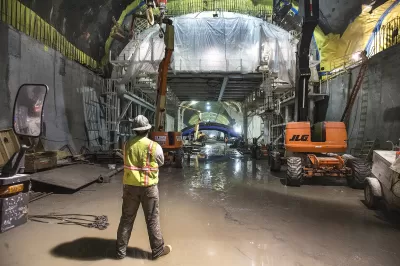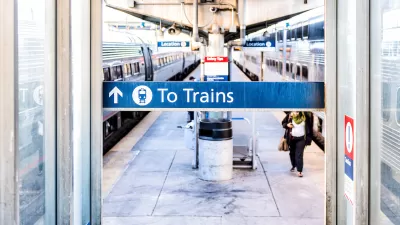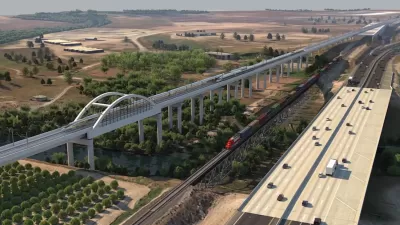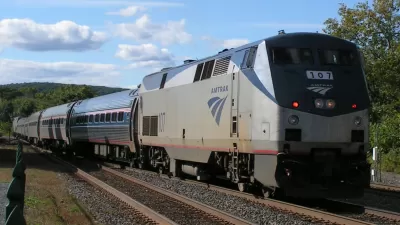Most major infrastructure projects fail to meet projected timelines or budgets. Some experts say this is a structural flaw built into "systematically deceptive" estimate practices.

California's High-Speed Rail. New York's East Side Access extension. Honolulu's light rail line. Ralph Vartabedian describes some of the infrastructure megaprojects that have run up against "cost overruns, engineering challenges and political obstacles that have made it all but impossible to complete a major, multibillion-dollar infrastructure project in the United States on budget and on schedule over the past decade." These persistent delays and cost overruns, writes Vartabedian, make it seem unlikely that the $1.2 trillion in new infrastructure promised by the Build Back Better bill will be completed anytime soon.
The $1.2 trillion package has bold goals, directing the majority of $500 billion to highways, $39 billion to urban transit, $65 billion to broadband projects and $73 billion to electrical grids, among other items. The nation’s busiest passenger rail line, Amtrak’s Boston-to-Washington corridor, would get the biggest slice of a $66 billion rail package. The infrastructure spending plan is unlikely to rescue some existing infrastructure projects that are bogged down with problems.
The ambitious timetable is hindered by sharply rising materials costs, shortages of skilled labor, and other supply chain factors, says Vartabedian. And this isn't a problem unique to the U.S.: an Oxford study of dozens of international projects found that 92 percent of them went over time and budget, pointing to "systematically and significantly deceptive" cost estimates.
In fact, experts argue that budget and time estimates are often flawed from the start. Former San Francisco mayor Willie Brown said the quiet part out loud in a 2013 newspaper column, calling the first budget for infrastructure projects "a down payment": "If people knew the real cost from the start, nothing would ever be approved. The idea is to get going."
FULL STORY: Years of Delays, Billions in Overruns: The Dismal History of Big Infrastructure

Montreal Mall to Become 6,000 Housing Units
Place Versailles will be transformed into a mixed-use complex over the next 25 years.

Planetizen Federal Action Tracker
A weekly monitor of how Trump’s orders and actions are impacting planners and planning in America.

DARTSpace Platform Streamlines Dallas TOD Application Process
The Dallas transit agency hopes a shorter permitting timeline will boost transit-oriented development around rail stations.

Study: 4% of Truckers Lack a Valid Commercial License
Over 56% of inspected trucks had other violations.

Chicago Judge Orders Thousands of Accessible Ped Signals
Only 3% of the city's crossing signals are currently accessible to blind pedestrians.

Philadelphia Swaps Car Lanes for Bikeways in Unanimous Vote
The project will transform one of the handful of streets responsible for 80% of the city’s major crashes.
Urban Design for Planners 1: Software Tools
This six-course series explores essential urban design concepts using open source software and equips planners with the tools they need to participate fully in the urban design process.
Planning for Universal Design
Learn the tools for implementing Universal Design in planning regulations.
City of Mt Shasta
City of Camden Redevelopment Agency
City of Astoria
Transportation Research & Education Center (TREC) at Portland State University
US High Speed Rail Association
City of Camden Redevelopment Agency
Municipality of Princeton (NJ)





























